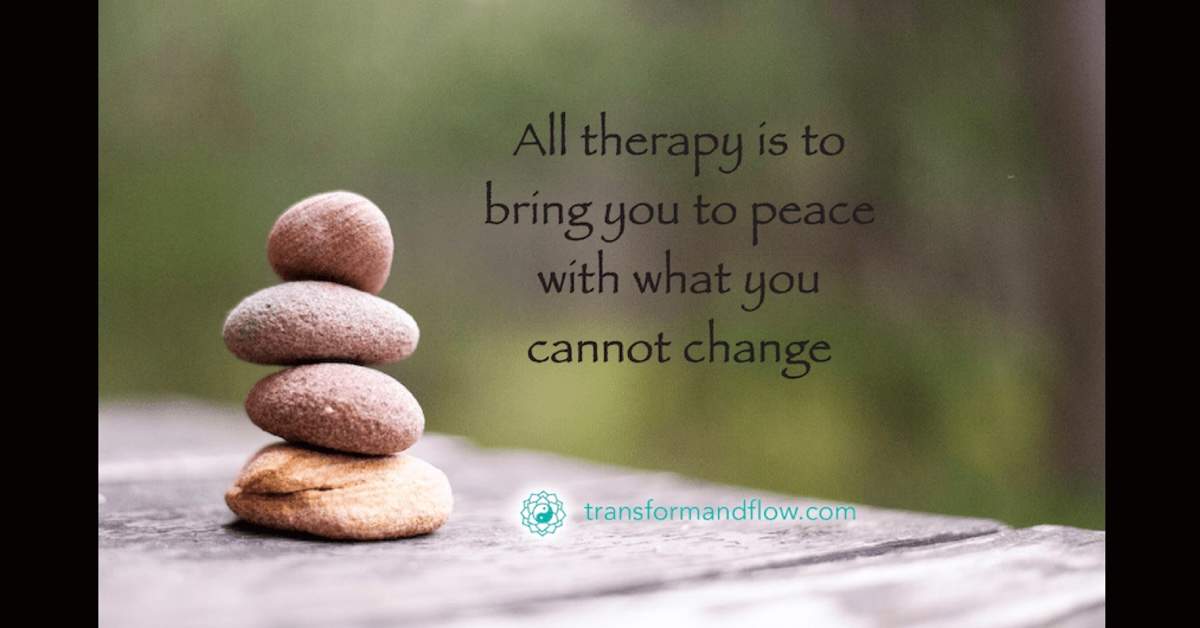All therapy is to bring you to peace with what you cannot change.
This deceptively simple statement, while seemingly fatalistic, holds a profound truth about the human condition and the therapeutic process. It’s not about resignation or defeat, but about a radical acceptance that frees us from the shackles of futile struggle. It’s about recognizing the boundaries of our control and finding serenity within those limitations.
We are creatures of aspiration, driven by the desire to shape our realities. Yet, life inevitably presents us with circumstances beyond our influence: the past, the actions of others, the inherent limitations of our physical bodies, and the unpredictable nature of existence itself. Clinging to the illusion of control over these unchangeable aspects of life leads to suffering, resentment, and a perpetual state of inner turmoil.
Therapy, at its core, is a journey toward peace. It’s a process of dismantling the narratives that fuel our resistance, of gently guiding us to acknowledge the reality of what is, without judgment or condemnation. It’s about cultivating the wisdom to discern between what we can influence and what we must release.
The Futility of Fighting the Unchangeable:
Imagine a river, its course set by the contours of the land. We can build dams and divert its flow temporarily, but ultimately, the river will follow its predetermined path. Similarly, we can expend immense energy trying to alter the past, control the actions of others, or deny the inevitability of loss. But these efforts are akin to building sandcastles against the tide—ultimately futile and exhausting.
This isn’t to say we shouldn’t strive for positive change. We should actively work to improve our lives and the world around us. But we must do so with a clear understanding of what lies within our sphere of influence. To waste our energy battling the unchangeable is to squander our potential for creating meaningful change in the areas where we can make a difference.
The Power of Acceptance:
Acceptance, often misconstrued as passivity, is, in fact, a radical act of empowerment. It’s about acknowledging the reality of our circumstances without surrendering to them. It’s about choosing to respond with wisdom and resilience rather than being consumed by resentment and despair.
When we accept the unchangeable, we free ourselves from the emotional burden of resistance. We create space for healing, growth, and the discovery of new possibilities. We learn to navigate life’s inevitable challenges with grace and equanimity.
Therapy as a Guide to Acceptance:
Therapy provides a safe and supportive space to explore the narratives that fuel our resistance to the unchangeable. Therapists employ various techniques to help us:
- Identify limiting beliefs: Uncover the ingrained assumptions that perpetuate our struggle.
- Process unresolved emotions: Release the emotional baggage associated with past experiences.
- Develop coping mechanisms: Learn healthy strategies for managing difficult emotions and situations.
- Cultivate mindfulness: Practice present-moment awareness to detach from ruminative thoughts.
- Reframe negative narratives: Challenge destructive thought patterns and develop more adaptive perspectives.
Through these processes and others, we learn to shift our focus from what we cannot control to what we can: our responses, our choices, and our attitudes. We learn to find peace within the boundaries of our control.
The Paradox of Control:
The paradox of control lies in the realization that true freedom comes from relinquishing the illusion of absolute control. When we stop fighting against the unchangeable, we discover a deeper sense of inner peace and resilience. We learn to adapt, to find meaning in the face of adversity, and to embrace the inherent uncertainty of life.
This isn’t about denying our pain or minimizing our struggles. It’s about acknowledging them without being defined by them. It’s about recognizing that even in the midst of suffering, we have the capacity to find peace and cultivate a sense of inner sanctuary.
The Journey, Not the Destination:
The journey towards acceptance is not a linear progression. It’s a process of ongoing self-discovery, a continuous exploration of our inner landscape. There will be moments of resistance, setbacks, and periods of doubt. But with each step, we move closer to a deeper understanding of ourselves and a greater sense of peace.
The Ripple Effect of Inner Peace:
When we find peace within ourselves, it radiates outwards, influencing our relationships, our work, and our interactions with the world. We become more compassionate, more understanding, and more accepting of others. We learn to navigate conflict with grace and to embrace the diversity of human experience.
Conclusion:
“All therapy is to bring you to peace with what you cannot change” is not a statement of resignation, but a profound invitation to embrace the wisdom of acceptance. It’s about relinquishing the futile struggle against the unchangeable and discovering the serenity that lies within. It’s about cultivating the inner strength to navigate life’s inevitable challenges with grace, resilience, and a deep sense of peace.
Through therapy, we learn to dismantle the narratives that fuel our resistance, to cultivate mindfulness, and to reframe our perspectives. We learn to find sanctuary within ourselves, even in the midst of life’s storms. This journey is not about changing the unchangeable, but about transforming our relationship with it, and in doing so, transforming ourselves.


